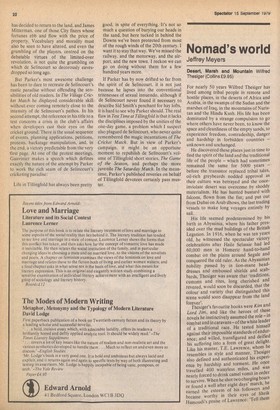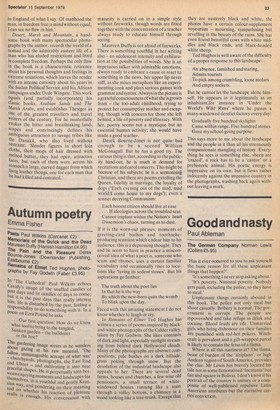Nomad's world
Jeffrey Meyers
Desert, Marsh and Mountain Wilfred ThesIger (Collins £9.95) For nearly 50 years Wilfred Thesigcr has lived among tribal people in remote and hostile places, in the deserts of Africa and Arabia, in the swamps of the Sudan and the marshes of Iraq, in the mountains of Nuristan and the Hindu Kush. His life has been dominated by a strange compulsion to go where others have never been, to know the space and cleanliness of the empty sands, to experience freedom, comradeship, danger and hardship in forbidden countries — unknown and unchanged.
He discovered these places just in time to find the spirit of the land and the traditional life of the people — which had sometimes remained the same for 5000 years — before the transistor replaced tribal tales, oil-rich greybeards nodded approval as their culture was betrayed and the onceinviolate desert was overcome by shoddy materialism. He has hunted bustard with falcons, flown from the fist; and put out from Dubai on Arab dhows, the last trading vessels to make long voyages entirely by sail.
His life seemed predetermined by his birth in Abyssinia, where his father presided over the mud buildings of the British Legation. In 1916, when he was ten years old, he witnessed the spectacular victory celebrations, after Haile Selassie had led 60,000 men in Homeric hand-to-hand combat on the plains around Segale and conquered the old ruler. As the Abyssinian nobility passed by in lion-mane headdresses and embossed shields and scabbards, Thesiger was aware that 'traditions, customs and rites, long cherished and revered, would soon be discarded, that the colour and variety that distinguished this scene would soon disappear from the land forever'. Thesiger's favourite books were Kim and Lord Jim, and like the heroes of these novels he instinctively assumed the role — in combat and in caravans— of the white leader of a traditional race. He tested himself against their impossible standards of endurance; and willed, transfigured and deified his suffering into a form of great delight. Like his master, T.E. Lawrence, whom he resembles in style and manner, Thesiger also defined and authenticated his experience by hardship and torment. He once travelled 400 waterless miles, and was nearly forced to drink camel vomit in order to survive. When he shot two charging boars or found a well after eight days' march, he earned the esteem of his followers and became worthy in their eyes of Sheik Hamoudi's praise of Lawrence: 'Tell them in England of what I say. Of manhood the man, in freedom free;a mind without equal; I can see no flaw in him.'
Desert, Marsh and Mountain, a handsome book with many spectacular photographs by the author, records the world of a nomad and the admirably austere life of a man who has eluded restrictions and lived in complete freedom. Perhaps the only flaw in the book is a characteristic reticence about his personal thoughts and feelings in extreme situations, which leaves the reader With an intense curiosity about his years in the Sudan Political Service and his African Campaigns under Orde Wingate. This work equals (and partially incorporates) his classic books, Arabian Sands and The Marsh Arabs, and establishes Thesiger as One of the greatest travellers and travel writers of the century. For he masterfully evokes the bitter and breathtaking landscapes and convincingly defines his ambiguous attraction to savage tribes like the Danakil, who also lived without restraint: 'Slender figures in short loin Cloths, their mops of hair dressed with melted butter, they had open, attractive faces, but each of them wore across his stomach a large, curved dagger from which hung leather thongs, one for each man that he had killed and castrated.'



































 Previous page
Previous page